Best online childhood development courses in 2025
Explore the top online childhood development courses of 2025, offering flexible learning and expert insights for parents and educators alike.
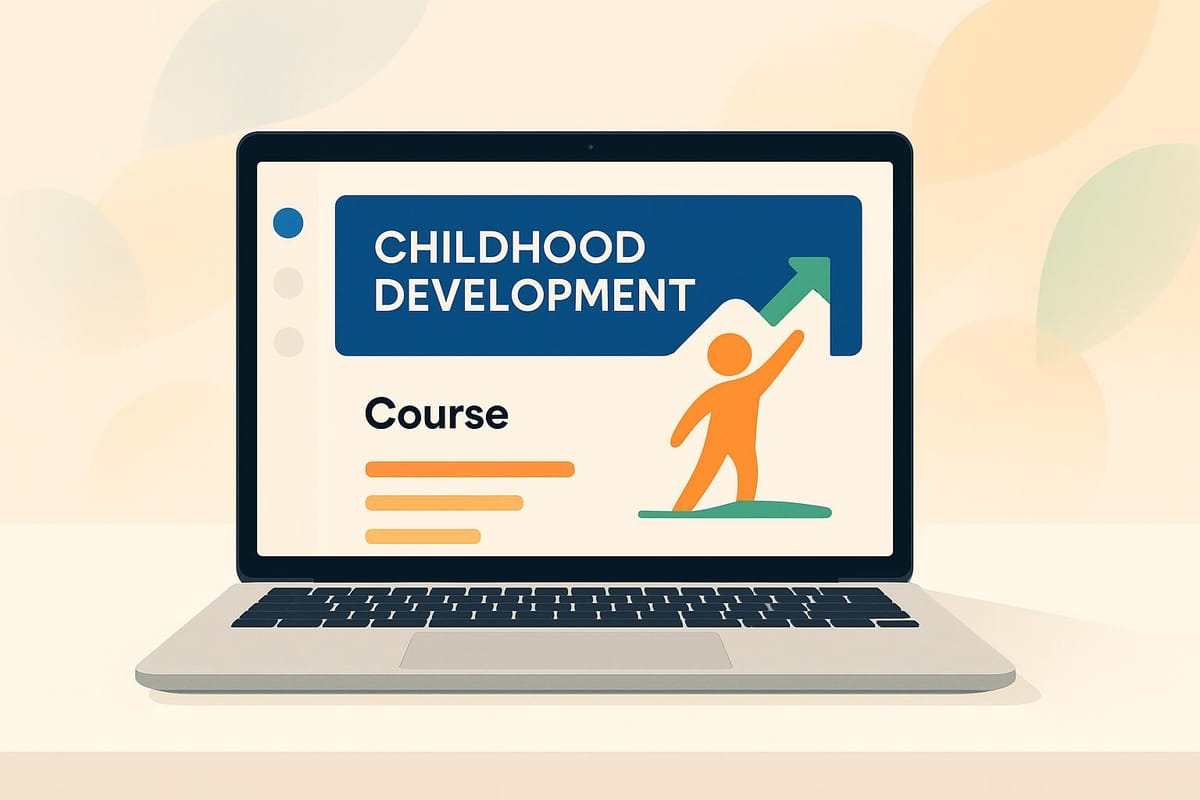
- Upskillist: Affordable and flexible with AI-powered tools, lifetime access, and a 7-day free trial. Ideal for busy parents and caregivers.
- Yale University: Prestigious program backed by the Yale Child Study Center. Offers in-depth learning and online options like the highly rated Coursera course.
- Stanford University: Focuses on the "whole-child" approach with free, self-paced online lessons. Great for practical learning and mental health insights.
- Utrecht University: A global perspective on child development, covering biological and societal factors in a 6-week online course.
- SUNY: Hands-on programs with field experience, affordable tuition, and state certification options. Best for those in New York.
Quick Comparison:
| Course Provider | Flexibility | Cost | Certification | Key Feature | Best For |
|---|---|---|---|---|---|
| Upskillist | High (self-paced) | $4.20/month | Global | AI tools & lifetime access | Parents & caregivers |
| Yale University | Medium | Higher cost | Prestigious | Expert faculty & evidence-based | Professionals & educators |
| Stanford University | High (self-paced) | Free/$250+ | Practical | Whole-child focus | Mental health & SEL focus |
| Utrecht University | Medium | Varies | International | Synapse-to-society approach | Cross-cultural insights |
| SUNY | High | Affordable | State-level | Hands-on field experience | NY residents & educators |
Choose a course based on your goals, timeline, and budget. Whether you’re a parent, educator, or childcare provider, these courses offer tools and knowledge to support children’s development.
Stanford (SCHE) Child Development: Behavior and Mental Health Online Short Course | Trailer
1. Upskillist Childhood Development Course
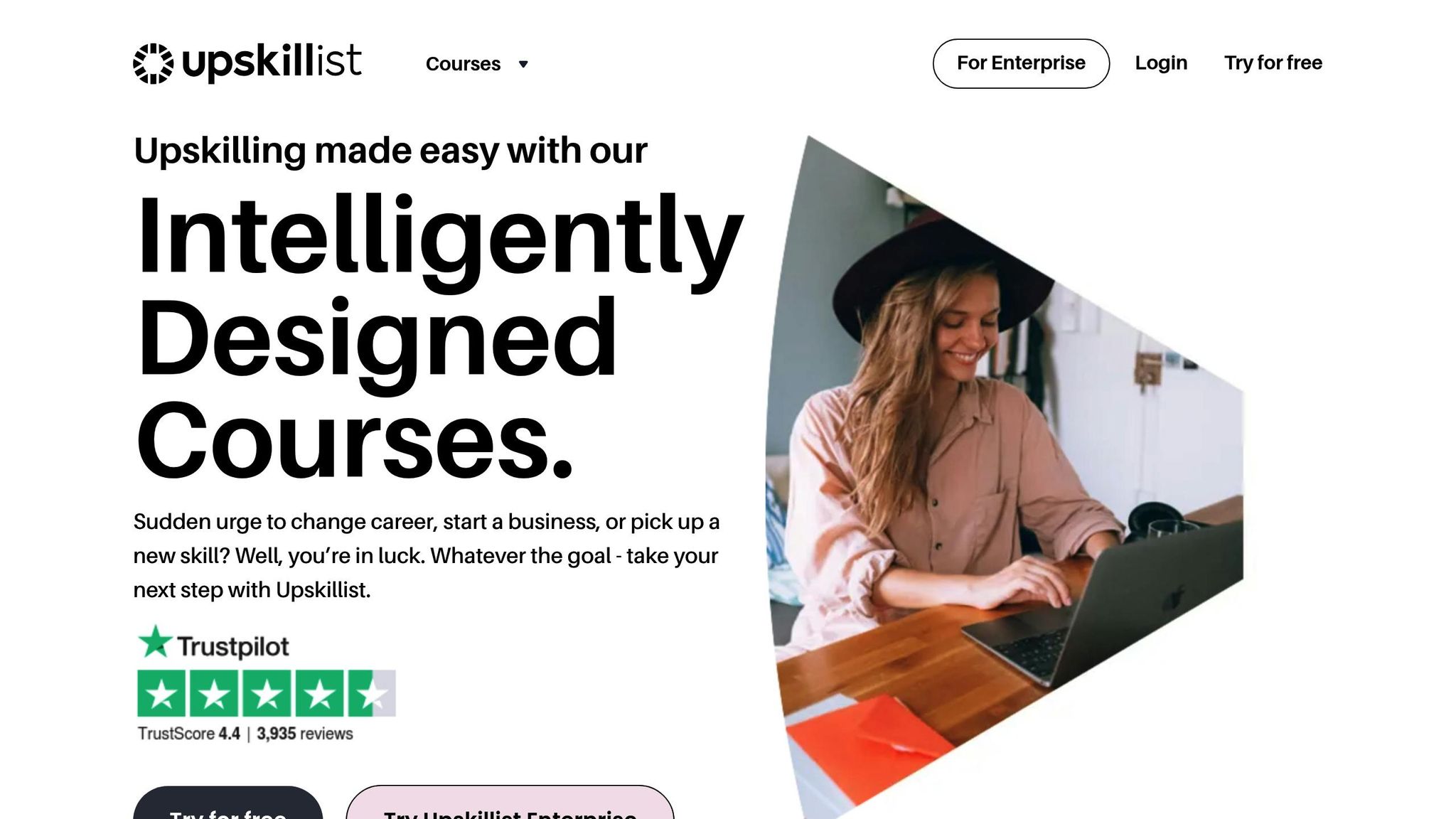
Upskillist's Early Childhood Development Course is an online program tailored for parents, caregivers, and professionals looking to sharpen their skills in nurturing and child development. With 29,198 students enrolled, this four-week course offers practical, hands-on learning designed to make a real difference in early childhood care.
Curriculum and Learning Focus
The course is structured into four carefully designed modules:
- Module 1: Introduction
Covers essential care routines like feeding, sleeping, and hygiene, alongside bonding activities. - Module 2: Intermediate Development
Dives into sensory growth (sight, hearing, touch, and taste), choosing toys, motor skill development, and encouraging social interaction. - Module 3: Advanced Development
Focuses on milestones such as grasping, rolling, crawling, and walking, as well as language and cognitive growth. - Module 4: Proficient Development
Tackles practical challenges like baby signing, selecting equipment, meal planning, potty training, habit-building, and managing tantrums.
The course also delves into a baby's postnatal adjustment and how it impacts their behavior and development .
Flexible Learning, Anytime, Anywhere
The program is delivered through pre-recorded video sessions, each lasting 30–50 minutes. This setup allows learners to progress at their own pace and access the material on any device with internet connectivity. Students enjoy unlimited access to class recordings and receive email reminders with direct session links, making it convenient for busy parents and professionals. The flexibility of this format is paired with expert-led instruction and thoughtfully crafted content.
Expert-Led and Globally Recognized
The curriculum is developed by Upskillist's in-house experts in collaboration with universities and industry professionals. This ensures the course meets high educational standards and is validated globally, giving learners confidence in the quality of their training.
Affordable Pricing Options
Upskillist offers this course through a subscription model priced at $4.20 per month. New students can take advantage of a 7-day free trial, along with continued access to all course materials and recordings.
Certification and Real-World Skills
Graduates of the course earn a certificate from Austin Peay State University, providing official recognition of their learning. The curriculum is packed with practical insights, helping students master everyday caregiving routines, support developmental milestones, and handle common challenges. This certification is especially valuable for those pursuing careers in childcare, education, or family support services, adding credibility to their professional profiles .
2. Yale University: Child Development Specialization
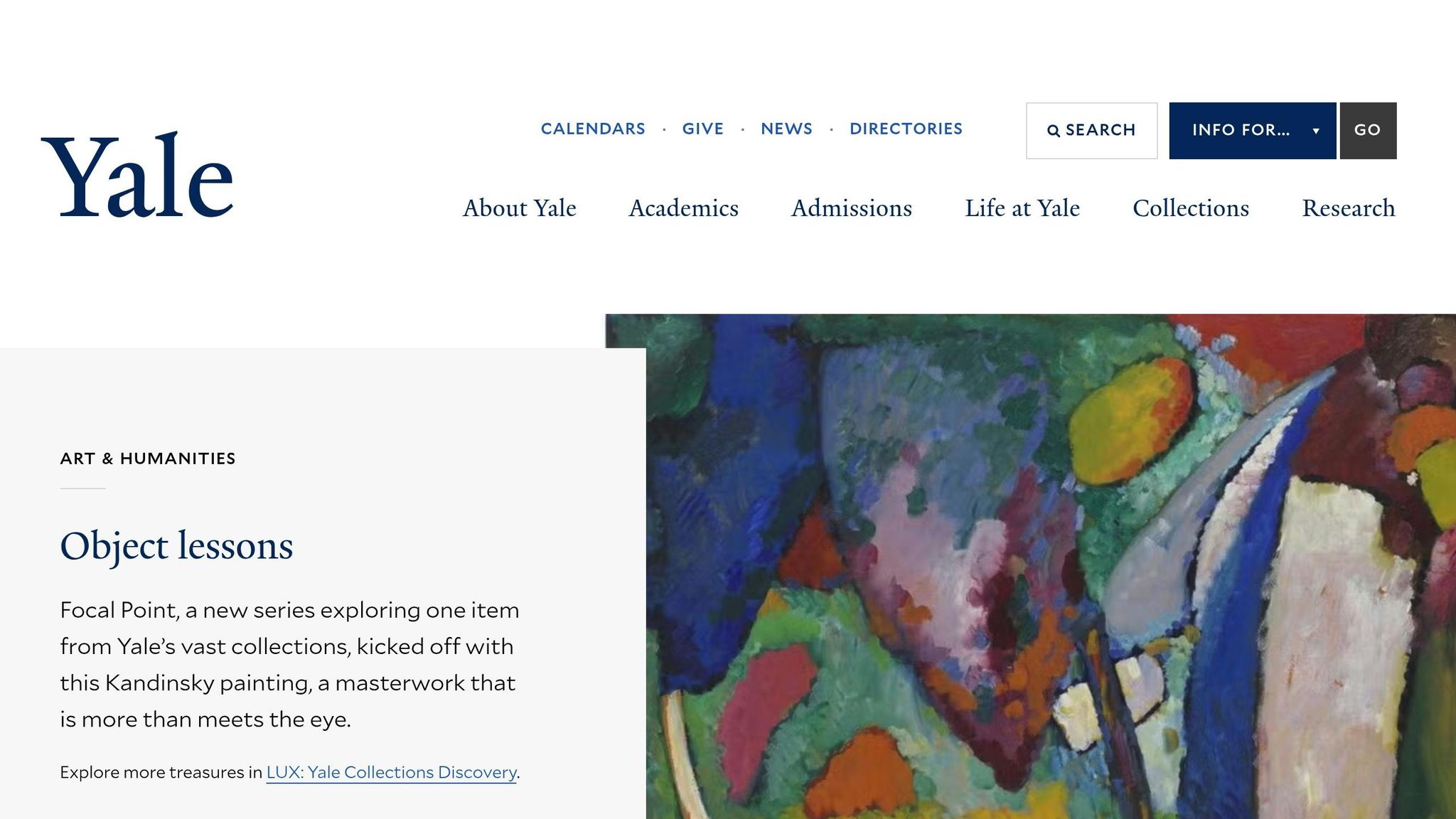
Yale University's Child Development Specialization is a highly regarded program, built on over a century of expertise from the Yale Child Study Center.
Curriculum and Learning Outcomes
This two-year program balances academic theory with hands-on clinical experience, designed to meet the growing demand for specialized training in child development. The first year includes a Summer Training program, where students focus on assessment, psychotherapy, and crisis management. It also features seminars such as Evidence-based Evaluation and Treatment Autism. The second year shifts to clinical placements in pediatric emergency and inpatient settings, with specialized tracks in Autism, Trauma, and Pediatric Psychology. The program emphasizes evidence-based practices and incorporates culturally responsive methods to prepare students for real-world challenges.
Flexibility and Accessibility
Yale offers several ways for professionals to access its child development training. For instance, an online course titled Everyday Parenting: The ABCs of Child Rearing is available on Coursera. This course, which takes about two weeks to complete at 10 hours per week, has drawn over 245,820 learners and boasts a 4.9-star rating from 3,088 reviews. Impressively, 99% of participants report being satisfied with the course. This online format is ideal for busy professionals, allowing them to learn at their own pace. Additionally, Yale provides reflective online training tailored for clinicians, therapists, and family service professionals. The program's accessibility is further enhanced by its faculty, known for their clinical expertise.
Instructor Expertise and Accreditation
The program is led by an accomplished team of faculty from the Yale Child Study Center, including Dr. Linda Mayes, the Arnold Gesell Professor of Child Psychiatry, Pediatrics, and Psychology. Dr. Mayes, who also serves as the Center’s Director, is widely recognized for her research on stress-response mechanisms in children. She is trained in both adult and child psychoanalysis, bringing a wealth of knowledge to the program. The faculty’s decades of experience in clinical interventions, research, and professional development ensure a rigorous and enriching education. As the Admissions Committee notes:
"The Admissions Committee seeks intelligent, mature, and highly motivated candidates who show the greatest promise for becoming leaders and contributors in psychology."
Practical Application and Certification
The program prioritizes hands-on learning through supervised clinical interventions and ongoing professional development. Students participate in integrative seminars, Grand Rounds presentations, and psychopharmacology seminars that focus on childhood psychiatric disorders. A Fellows Seminar addresses topics like diversity, equity, inclusion, special education law, and program evaluation. Additionally, Career Development and EPPP Preparation seminars equip students for professional success. Clinical placements in pediatric and inpatient environments, along with specialized tracks in Autism, Trauma, and Pediatric Psychology, provide students with the skills needed to serve a wide range of populations effectively.
3. Stanford University: Early Childhood Education Online Program
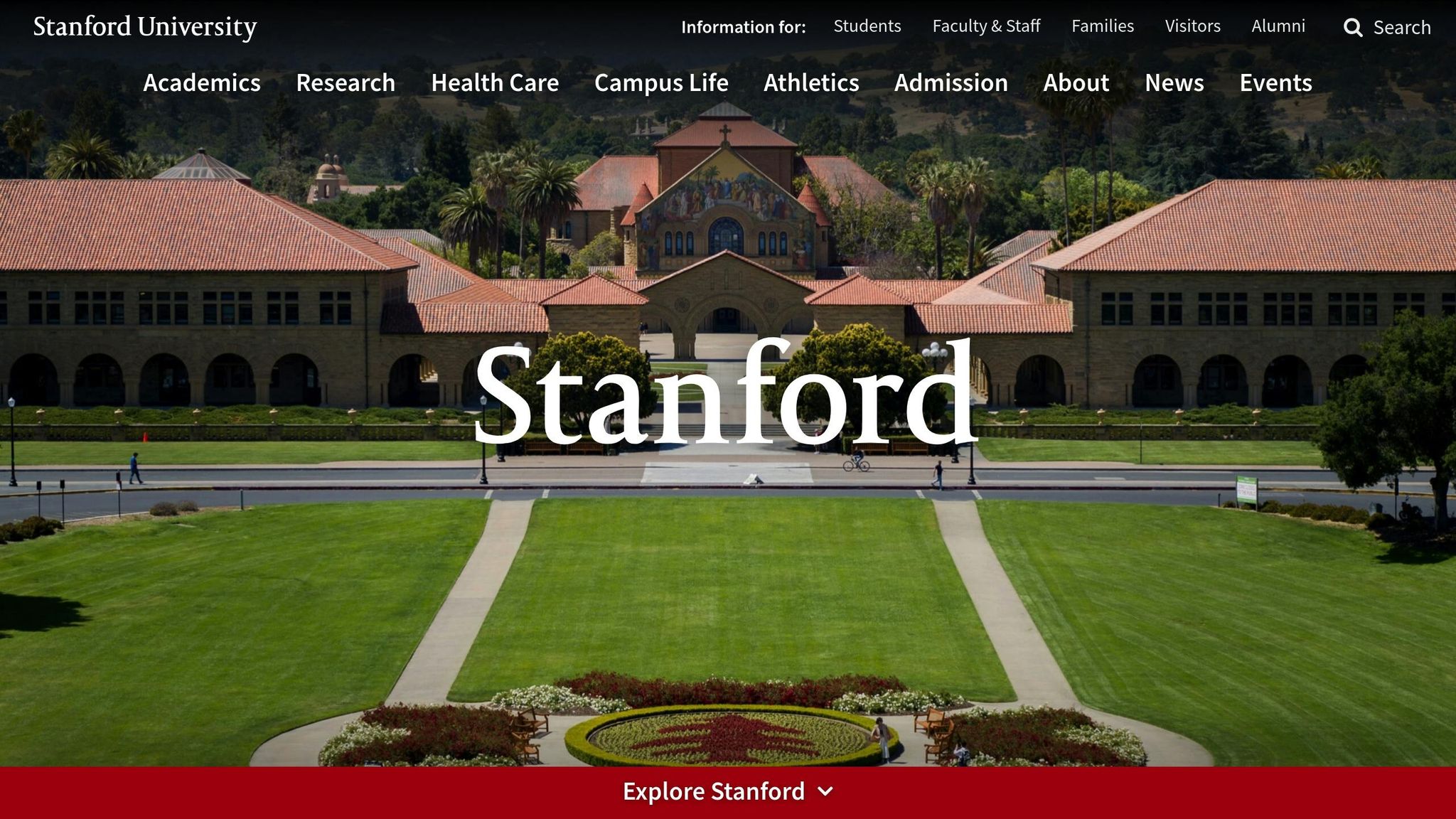
Stanford University’s Early Childhood Education program, offered through its Center on Early Childhood, blends groundbreaking research with practical training. This program leverages Stanford’s expertise in education and innovation to tackle the pressing challenges in childhood development today.
Curriculum and Learning Outcomes
The program takes an interdisciplinary approach, focusing on the whole-child concept. This means addressing not just academic skills but also social, emotional, and physical development. A key emphasis is placed on mental health and social-emotional learning (SEL). Research areas such as stress, unpredictability, and responsive caregiving directly shape the curriculum, ensuring that participants gain practical, evidence-based insights. The program also prioritizes addressing structural inequities, fostering partnerships with communities, and preparing educators to create inclusive, supportive learning environments [22, 24]. All of this is delivered in a format designed for flexibility and accessibility.
Flexibility and Accessibility
Stanford makes its courses accessible to busy professionals by offering free, self-paced online options. All that’s needed is an internet connection. While many courses allow participants to learn at their own pace, some follow a cohort model with recommended deadlines. Importantly, there are no formal academic prerequisites - no TOEFL scores, admission applications, or prior credentials are required [25, 26].
Instructor Expertise and Accreditation
The program is led by Dr. Philip Fisher within the Stanford Accelerator for Learning and benefits from the expertise of the Graduate School of Education. Faculty members bring deep knowledge in areas like stress response and caregiving, offering students a rich, interdisciplinary learning experience.
Practical Application
Beyond theory, the program emphasizes real-world application. Participants gain tools and hands-on experience to address structural inequities and foster inclusive learning environments. Training is rooted in evidence-based strategies, equipping educators to support whole-child development. This includes implementing SEL techniques and mental health support systems. With this practical foundation, graduates are well-prepared to meet the evolving needs of early childhood education [22, 24].
4. Utrecht University: Child Development and Education Online Course
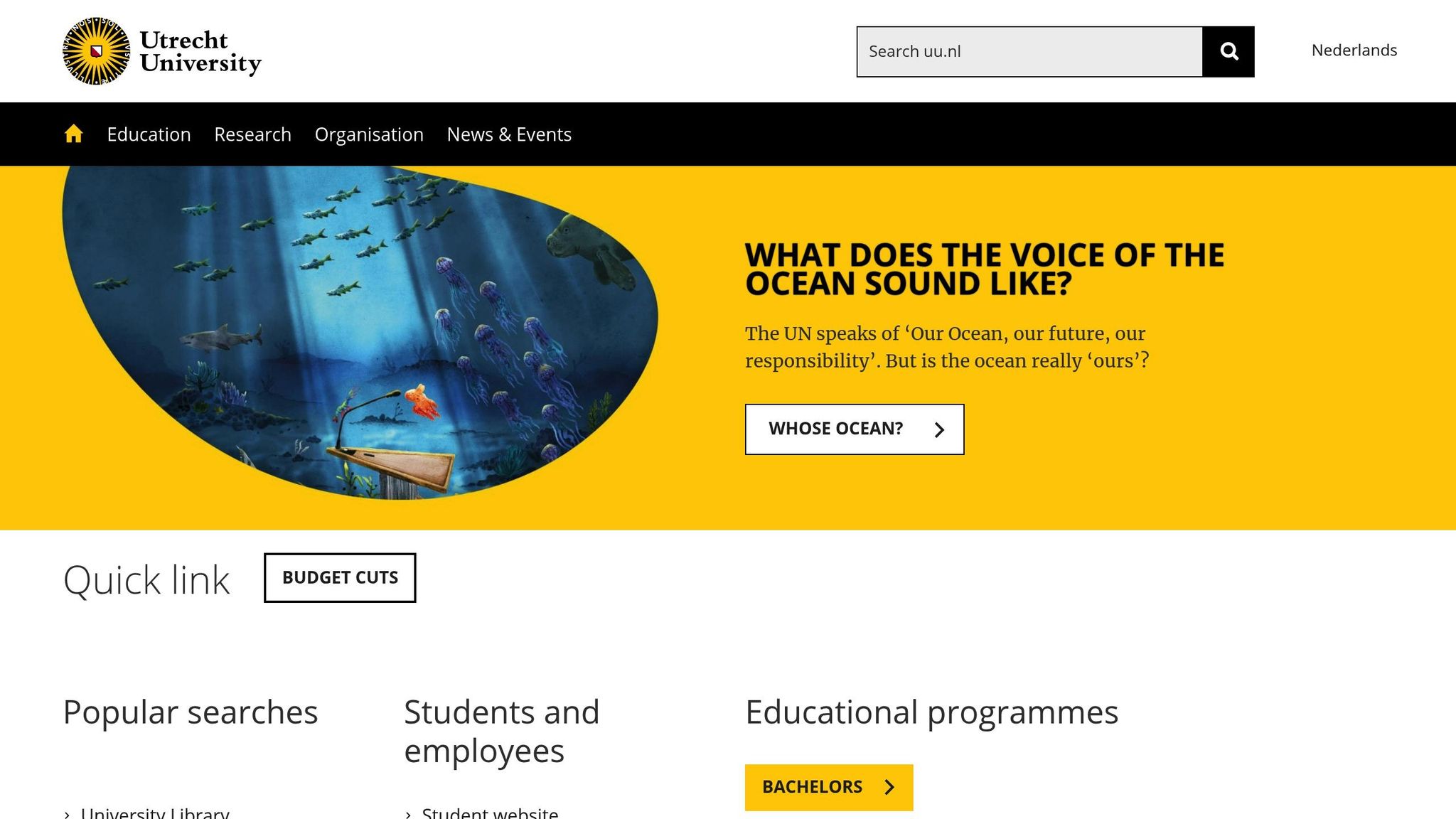
Utrecht University offers the online course "Understanding Child Development: From Synapse to Society", which brings together experts to explore how child development is shaped by both biological processes and societal factors. This course stands out as one of the top online learning opportunities in 2025.
Curriculum and Learning Outcomes
This six-week course takes a step-by-step approach to child development. It starts with foundational topics like developmental systems and brain/motor skills and progresses to cognitive, language, and social-emotional development. By the final week, all these concepts are brought together to provide a comprehensive understanding.
The course bridges theory and practice with video portraits of researchers sharing their work. Participants gain a range of skills, including developmental biology, communication, systems thinking, and research methods.
Flexibility and Accessibility
Designed to accommodate busy schedules, the course is self-paced and requires about 28 hours of total effort, spread over six weeks. Most learners dedicate around four hours per week to complete the material. There are no strict deadlines, and participants can move through the content at their own speed.
The course is also highly accessible - no prior academic experience or qualifications are necessary. All you need is an internet connection to join.
Instructor Expertise and Accreditation
Dr. Jorg Huijding leads the course, reflecting Utrecht University's dedication to interdisciplinary research and global engagement. This commitment is evident in the course's strong 4.6/5-star rating on Coursera.
Practical Application
What makes this course especially valuable is its focus on practical application. Students get an inside look at how researchers from different fields collaborate to address real-world challenges in child development. From understanding neurological processes to tackling societal influences, the interdisciplinary approach is front and center.
5. The State University of New York (SUNY): Early Childhood Development Certificate Program
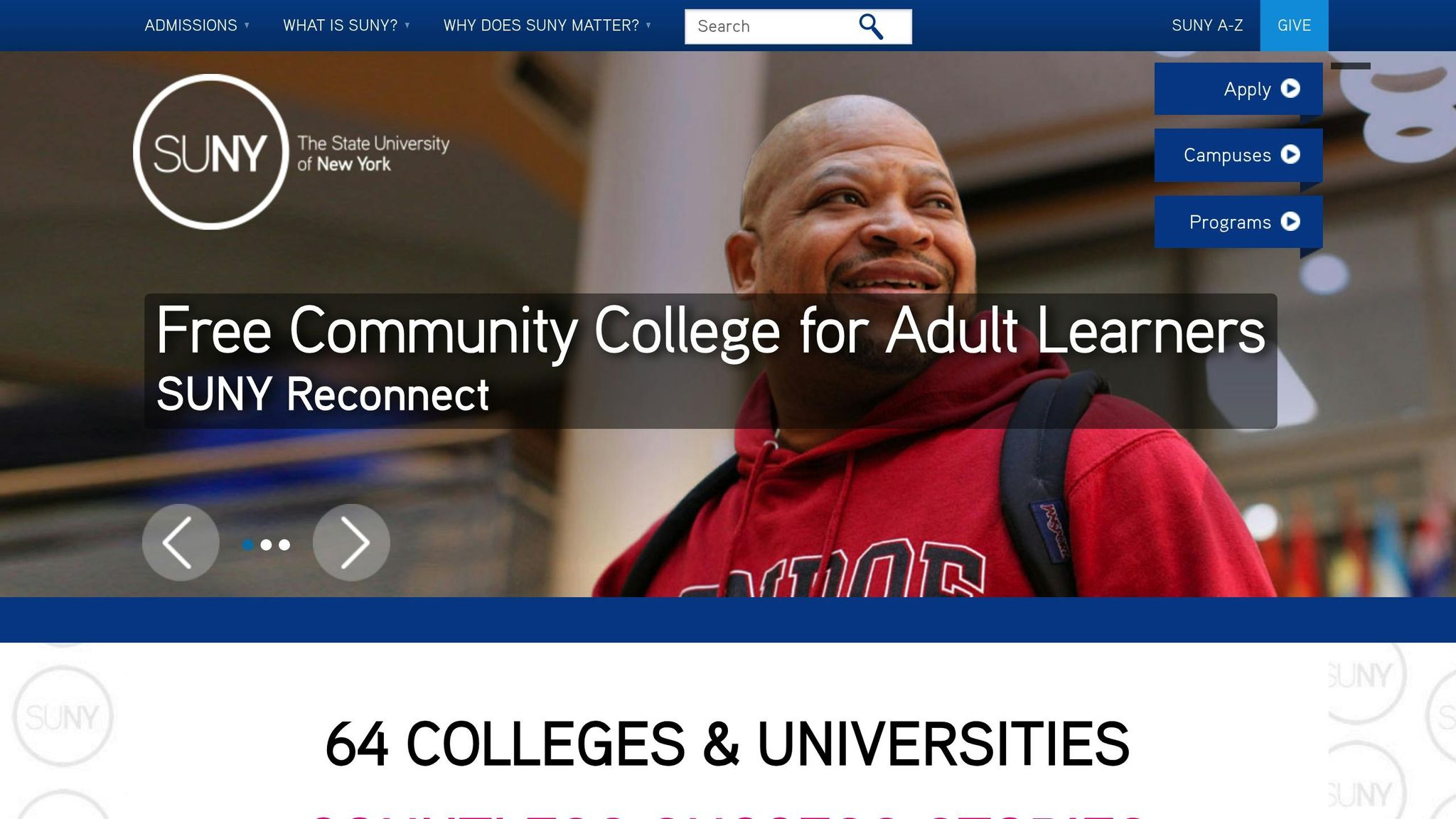
The State University of New York (SUNY) system provides several Early Childhood Development Certificate Programs. These programs are designed to prepare students for roles in early education through a strong emphasis on hands-on, field-based learning. This approach ensures students gain practical skills essential for working effectively in early childhood development settings.
Curriculum and Learning Outcomes
SUNY's programs are built around applied learning. For instance, students at SUNY Orange complete nearly 40 hours of observation in local child care centers, allowing them to connect classroom knowledge with real-world practice. The curriculum includes critical areas like child development theory, developmentally appropriate practices, and operational aspects of child care centers. These courses also explore how to work with diverse families and communities. Graduates leave with a solid understanding of child development and practical skills necessary for their careers.
At SUNY Broome, the program takes it a step further by preparing students for roles such as Lead Teacher. The coursework focuses on ecological relationships, assessment methods, and integrating STEAM (Science, Technology, Engineering, Arts, and Mathematics) into early education.
Flexibility and Accessibility
SUNY understands the diverse needs of its students, especially working professionals, and offers flexible learning options. SUNY Orange provides part of its Early Childhood Development and Care certificate program online, making it easier for students to balance their studies with other responsibilities. SUNY Adirondack expands accessibility through online and hybrid courses, while SUNY Plattsburgh offers graduate-level programs that are fully online, catering to the schedules of busy educators.
Instructor Expertise
The programs are led by experienced educators who bring proven child development theories into the classroom. Students benefit from collaborative and reflective field assignments that build technical skills and professional judgment. The curriculum also emphasizes critical thinking and highlights the role of children’s literature in early childhood education.
Pricing and Financial Options
SUNY is committed to offering affordable education. For the 2024–25 academic year, tuition for state campuses is $7,070 annually (plus approximately $1,830 in fees) for New York residents. Community colleges in the SUNY system charge around $5,400 annually (plus about $1,010 in fees). Financial aid is available through options like FAFSA and the TAP application for New York residents. Additional funding opportunities include grants, scholarships, and student loans, as well as programs like the CUNY/SUNY Early Childhood Workforce Scholarship and the Educational Incentive Program (EIP), which support training and educational activities.
Practical Application and Certification
SUNY’s emphasis on hands-on experience ensures that graduates are ready to step into entry-level child care roles immediately upon completing the program. Tracks like SUNY Broome’s Lead Teacher preparation equip students with the skills to design lesson plans, foster respectful relationships with families, and integrate critical thinking into their teaching practices. The curriculum also underscores the importance of children’s literature and provides practical training that aligns with certification requirements, making graduates well-prepared for the workforce.
Course Advantages and Drawbacks
Each course comes with its own set of strengths and challenges that can shape both your learning journey and career prospects. Choosing the right one means weighing these factors against your current needs and future goals.
Upskillist's Childhood Development Course is known for its accessibility and forward-thinking approach. With a 7-day free trial, you can explore the platform without commitment. Its AI-driven tools, such as Compass AI and Pathfinder, craft personalized learning paths tailored to your needs. Plus, lifetime access allows you to revisit lessons anytime. However, as a relatively new platform, it might lack the prestige some employers value.
Yale University's program is highly regarded for its academic reputation, boasting a 4.9/5 star rating and instruction from expert faculty. The curriculum provides an in-depth exploration of child development, covering physical, cognitive, and emotional growth from conception to adolescence. The downside? It comes with a higher price tag.
Stanford University's course emphasizes practical, hands-on learning, particularly in areas like child nutrition and cooking. This approach has earned it a 4.8/5 star rating. Its competency-based format lets students advance by demonstrating skills rather than simply completing coursework. However, some may find the accelerated pace overwhelming.
Utrecht University's program offers a global perspective on child development, earning a 4.6/5 star rating. The curriculum spans "from synapse to society", examining how children grow within broader social frameworks. That said, its European focus may not align perfectly with U.S. career expectations.
SUNY's certificate programs are tailored for practical, hands-on training in real childcare settings, with a 4.8/5 star rating. These programs are especially beneficial for New York residents, as they align closely with state certification requirements. However, this state-specific focus may limit their appeal to those outside New York.
Here's a quick comparison of the key features:
| Course | Flexibility | Pricing Range | Certification Value | Key Strength | Main Limitation |
|---|---|---|---|---|---|
| Upskillist | High – AI-powered, self-paced | 7-day free trial | Globally recognized | Lifetime access & modern tools | Emerging brand |
| Yale University | Medium – structured format | Higher cost | Prestigious credential | 4.9/5 star rating & expert faculty | Higher cost |
| Stanford University | High – competency-based | $250–$500 per credit | Practical focus | Skills-based, hands-on learning | Accelerated pace |
| Utrecht University | Medium – online format | Varies by program | International perspective | Global approach to development | European focus vs. U.S. norms |
| SUNY | High – online/hybrid options | Varies | State certification | Practical training experience | Geared toward New York residents |
When deciding, consider how these features align with your career goals. For instance, self-paced programs are ideal for those juggling work or family commitments, while accelerated options can help you gain certification in as little as 12–24 months - or even 15 months in some competency-based formats.
Certifications are another critical factor. They not only validate your expertise but also enhance your resume in a competitive field. Many programs align their curriculum with state education standards and prepare students to work with children, including those with special needs.
If you’re looking for immediate certification, SUNY's hands-on approach might be the best fit. For long-term career growth, Yale's prestigious program could unlock more opportunities. And if cutting-edge technology and flexibility appeal to you, Upskillist's platform offers tools and lifetime access that traditional programs may not yet provide.
Conclusion
When selecting a course, it's important to consider your career goals, preferred learning style, and budget. Each program offers unique benefits tailored to different professional needs in 2025.
Upskillist is a great option for professionals who value modern and flexible learning. With a 7-day free trial, AI-powered personalized features, and lifetime access to materials, it’s designed to grow with your career.
Yale University's program shines with a 4.9/5 rating and instruction from expert faculty, making it a solid choice for roles that require the credibility of a prestigious institution.
Stanford University's course caters to hands-on learners who thrive on practical application. It provides opportunities to apply skills in real-world scenarios, ensuring a more interactive learning experience.
Utrecht University offers an international perspective on child development, making it especially appealing for professionals interested in cross-cultural practices and global insights.
SUNY's certificate program provides a straightforward path into the field, ideal for those looking to quickly transition into a career in early childhood education.
These programs align with current industry trends and the growing demand for qualified professionals. The field is projected to see an 8.7% nationwide growth through 2026, reflecting strong job market opportunities.
"A career in early childhood education means you have a daily opportunity to make a positive difference in the lives of children and have a more lasting impact on future generations", says Michele Lucia, BS in Childhood Development from Walden University.
Choose a program that matches your career aspirations, timeline, and learning preferences. Whether you value flexibility, academic recognition, practical training, or a direct entry into the workforce, these options provide a solid foundation for a fulfilling career in childhood development.
FAQs
How can I choose the best online childhood development course to meet my goals?
Choosing the right online childhood development course starts with understanding your personal and career goals. Are you aiming to earn a Child Development Associate (CDA) credential or looking to grow your expertise in early childhood education? Pinpointing your objectives will help you narrow down programs that align with your aspirations.
Pay attention to the course structure. Does it offer flexible scheduling with self-paced options, or are live sessions more your style? Both formats have their advantages, so pick one that works best for your routine. Also, don’t overlook accreditation and the reputation of the provider - these factors play a big role in ensuring the course delivers quality education. By focusing on these details, you can find a program that fits your needs and helps you take the next step in your career.
How do Yale and Stanford's child development programs differ?
Yale's child development program zeroes in on early childhood care, policy research, and societal impacts, emphasizing areas like women's empowerment and community growth. On the other hand, Stanford takes a broader route with an interdisciplinary approach, combining child development, psychology, and education, all while focusing on practical applications and research-backed insights.
The primary distinction lies in their focus: Yale leans heavily toward policy and societal outcomes, whereas Stanford delves into child development through a mix of academic fields for a more well-rounded perspective.
Can I enroll in a childhood development certification program at SUNY if I live outside New York?
Yes, you can enroll in a childhood development certification program at SUNY even if you don’t live in New York. SUNY offers programs that are open to out-of-state students, with flexible remote learning options that make it easy to participate no matter where you are. Many of these programs also help students meet the requirements for certification in New York State, making them a solid option regardless of your location.

